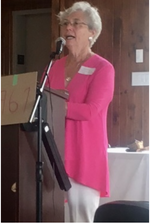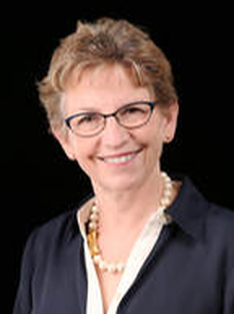|
Dear Members:
It is my pleasure to write to you after a successful 2023 OHEA Annual Meeting. At the meeting, there were several OHEA Past Presidents present, and a couple of people who attended their their first Annual Meeting, Then, reports were given, there was discussion about member engagement and elections were carried out. After the elections, Jason Eaton, Cailin Whincop, Allison Teich, Cathy Enright, Roula Hawa, Mary Carver, and myself, Camille Naranjit remain on the OHEA Board of Directors to serve you. I am giving a warm welcome to Linda Robbins, our newly acclaimed secretary-treasurer. She brings forth a wealth of experience from her past involvement with CHEA. We look forward to working with her in her term to come. On a sadder note after serving OHEA well, we say goodbye to Brooke McLean, Taylor Page, Ranuri Kandumulla, and Shelby Weaver, and thank them for their dedication and service to our association. At present, the branch representatives (except Ottawa Branch as Mary has decided to stay on) and the student liaison will be appointed and notify us prior to starting up again in September. At present there are still vacancies (VP Communications, VP Social media, 1 VP Public Policy, VP Professional Development, 1 Member-at-Large) and we are looking to appoint members in good standing. Please, if you have a slight interest in stepping up in volunteering with a project or joining our Board of Directors, we would love to hear from you. Also, if you can think of a colleague who is a member of OHEA who may be interested, please invite the member to contact us. We will give you information with no strings attached. Simply email Eileen for more information at EileenOHEA@outlook.com. Have a wonderful summer. Camille Naranjit President, OHEA
0 Comments
Ottawa HEA Celebrates its 90th Anniversary — Revisiting… A 1967 Outlook at Food in Year 20006/22/2023 At the Ottawa Home Economics Association (Ottawa HEA) 90th Anniversary Celebrations held on June 6 , 2023, Home Economist Elizabeth Larmond Elliot presented a ‘revisited’ talk she had given in 1967 forecasting what Canadian would be eating in Year 2000. Elizabeth Larmond Elliot is former Director of Industry Services at the Canadian Gain Commission, in Winnipeg, Manitoba. Retiring in 1999, Elizabeth has lived in Ottawa for several years where she stays active in several groups including Ottawa HEA. Originally, Elizabeth’s talk projected 33 years into the future, but she clearly updated it for this occasion and compared — Then and Now. Elizabeth took all 31 members in attendance for the Ottawa HEA celebration down memory lane in her review of Canadians’ eating habits over several decades. Canadians basically went from a meat and potatoes diet in the mid-60’s where beef was the primary protein to an era where chicken ruled often served with rice or pasta instead of potatoes. Canned foods have been replaced by fresh fruits and vegetables. Some promising developments of the 60’s such as food irradiation have been rejected by consumers while others, plant-based protein, for example, have been accepted. One unexpected development is ultra-high processed foods which are high in sodium, sugars and saturated fats. “In the end, consumers rule”, explained Elizabeth. Trends were influenced when more women entered the workforce. The percentage of women working outside the home rose from 37 in 1964 to 82.8% this year. There was a new availability and taste for global flavours. International tastes increased as travel increased in the past 50 years and the Internet has influenced both eating and spending habits. Quoting Dr. Malek Batal, Professor & Research Chair Human Nutrition, University of Montreal, Elizabeth explained, “A more diverse population, changing health trends and a globalized food chain have changed Canadians' palate in ways unimaginable in the '60s. When you look at demographic changes, economic changes, trade changes and health messages, you understand food changes." CBC News — 2018. A special thank you to Elizabeth Larmond Elliot for sharing her knowledge and insight as she helped to make the 90th Anniversary celebrations even more special. The OHEA Board of Directors would like to offer congratulations to the following members who were awarded the following 2023 awards:
OHEA Volunteer Award Certificates of Merit
OHEA President's Distinguished Service Award
Cathy Boucher graduated from the University of Ottawa in 1973 with a Bachelor of Science in Home Economics.
The Home Economics, Dietetics Department was located in its own small, two story, grey, building on Waller Street. There was a large food laboratory on the main floor, along with a library and a common room. Mme Dagenais looked after the lab, buying supplies and making sure everything was in its place as the labels on the cupboards and drawers dictated. The textile laboratory for sewing was located on the second floor with a few small classrooms which were also used by the Arts Faculty. The common room had green wicker furniture from the Estate of Mackenzie King, as we were told. It was very comfortable, and many students took naps there. We had our own library and librarian before the University amalgamated all the libraries into one. The basement had lockers and washrooms. We were across the street from the cafeteria housed in the basement of the administration building-easy to get there even in the winter. We did the daily long trek to the other side of the campus to take our science courses, biology, chemistry, biochemistry etc. We were fit. The majority of our professors were Sisters who belonged to the Congregation Notre Dame. Sister Lucie Blondeau was the head and I recall fondly Sister Gisele Dube’ my foods professor. They were all awesome and cared about us as human beings. I enclose a letter of reference that Sister Gisele wrote for me to get my first job at Best Food/Canada Starch in Montreal. I also include a reference letter after leaving Best foods for the Government of Canada. I was student president of the Department in third year. That meant I attended the faculty meetings which I enjoyed. I was there when the Sisters decided to give us a coffee spoon for graduation. We all received a pinky gold ring with ten facets which was sponsored by the Canadian Home Economics Association, which also came with a pledge. With the textile courses came tailoring and a fashion show each year in the spring. I took tailoring, and flat pattern design but was never great at it. We had to make a gingham blouse, oh the stress. We had to do food demonstrations in third year and in fourth year we did a major research project. I can vividly remember the demonstrations; I did one on cocktails and Anne Gourley one on sandwiches and Carmen Smith on bannock. My research project was on canola, then known as rapeseed. There was a holistic approach to home economics and although I majored in foods, I also took the textile courses and family management. That approach has stood me well in a career in the food industry and as a long-time public servant in communications. Many of the graduates were dietitians who were, and still are, required to do an internship before they become an RD, registered dietitian. After graduation they went to hospitals for their internship. Some in the Home Economics stream went to teachers’ college, some to public service and some, like me, to industry. Twenty-five students graduated in 1973. Although the Department was disbanded in the 1980s, its legacy lives on in the good works of its Home Economics and Dietetics graduates. The Honourable Elizabeth Dowdeswell, Lieutenant Governor of Ontario was invited to attend the 90th Anniversary and AGM of the Ottawa Home Economics Association, held June 6, 2023 at the Britannia Yacht Club.
Her Honour holds a Bachelor of science in Home Economics degree from U of Saskatchewan and a Master in Science in Behavioral Studies from Utah University. She is an Officer of the Order of Canada. A member of the Order of Ontario, and the recipient of numerous distinctions and fellowships. She holds 12 honorary doctorate degrees and she is our current, Lieutenant Governor of Ontario. Her office was unable to schedule an in-person visit to Ottawa; however, she did consider it seriously. Instead, she sent this letter read by Mary Carver, P.H.Ec., to open the luncheon celebrations. Click here to see the letter. I worked as a student with Home Economist, Anne Burns in the Brooke Claxton circa 1972. She authored the famous books—“The Canadian Mother and Child “ and "Up the Years from One to Six.”
What I learned could fill a very large book and her love of all things Home Economics remains with me to this day. Her niece and my friend, Elizabeth Larmond Elliot and I met through her Aunt Anne. May I add--- both very proud of their Saint John, New Brunswick roots. Farewell to the Brooke Claxton Building — many, many Canadians are healthier and happier thanks to the excellent public servants who served there. A parting shot, the cafeteria was great and the public servants had the habit of eating delicious home made soup during the morning break. Anne told me that was the best example of how food habits rule our lives. Judy Joannou offers wisdom to home economists interested in a career in fashion. Her father, an executive in the fashion industry introduced her to sewing and fashion design which suited her creative spirit. She graduated from Cornell University, in Apparel Design and studied abroad at the London College of Fashion. This led to her dream: becoming a fashion designer in New York City. At 23 she was travelling the world.
Several years later she met and married a Canadian, settled in Ashton and established her home-based business on a dime. Judy created one-of-a kind vests made from discarded upholstery samples and vintage buttons purchased at a garage sale, before re-purposing was a trend! Home sewers assembled them for her. Then she travelled throughout Ontario and sold them to boutiques and through the craft show circuit. As the business grew so did her collection, noted for mix and match high end fashions which she had produced in Toronto. After 26 years of being on the road she opened her first retail store in Almonte and introduced other brands to her offerings. In the Spring of 2020, nudged by the pandemic's forced store closure she upgraded her website to a full online store and brought the shop to her customers with video fashion shows. She continues to run both her retail store and website https://www.judyjoannoudesigns.ca Judy’s Wisdom
 Eleanor died peacefully on February 10, 2023 in her 94th year, with her family by her side.
Eleanor is lovingly remembered by her children Roxanne (Terry), Greg (Candy) and Andrea (Terry). She was the much loved grandmother of Jenna (Rich), Marley (Jason), Tamara (Matthew), Breanne, Alexandra (Justin), Ainsley (Ian), Scott (Towella) and Graham (Denise). Eleanor was the proud great grandmother of Clara, Mia, Penny, Isla, Carter, Nella and Emmett. She is survived by her dear sister Gertrude and her 6 nieces and nephew. Eleanor was predeceased by her husband of 62 years, James Carlson, her parents Lewis and Reta, and her siblings Lewis and Mary. Eleanor was born on Oct. 16, 1928 in the historic town of Shelburne N.S. After graduating from Shelburne Regional High School she moved to Toronto where she received her Honours B.A. from the University of Toronto. She was thrilled to attend her 65th UofT reunion with her daughter Andrea. Eleanor also received her teaching certificate from the Ontario College of Education and her M.Sc. from the University of Manitoba. Eleanor began her Home Economics teaching career in Kenora, Ontario. When Jim's military career brought them to Zweibrucken, Germany, she taught at 3 Wing. She completed her teaching career in Winnipeg, Manitoba at Grant Park High School where all three of her children attended. During that time, she co-wrote the Family Studies textbook This is the Life. When Eleanor retired from teaching, she and Jim moved back to her family home in Shelburne. Jim and Eleanor were passionate world travelers who loved to entertain. She was a wonderful cook who combined her love of food and history to publish a cookbook entitled Loyalist Foods in Today's Recipes. Eleanor became a certified genealogist and wrote several books tracing the roots of a variety of Nova Scotia families. She also edited the Lost Mariners of Shelburne County and co-authored the Veterans of Shelburne County. Eleanor was a founding president of the Shelburne County Genealogical Society. Another passion of Eleanor's was rug hooking. One of her pictorial rugs of West Blanche was featured in A Celebration of Hand-Hooked Rugs IV and she has some pieces displayed in the NS Rug Hooking museum. The family is grateful for the incredible care that Eleanor received at Ridgewood retirement home in Bridgewater. If desired, donations to the Shelburne County Archives & Genealogical Society or the Shelburne Loyalist Food Bank would be gratefully received. A celebration of Eleanor's life will take place on Sunday July 30, 2023 from Huskilson's Funeral Chapel, 58 Bulkley Street, Shelburne, N.S. Online messages of condolence may be made here. Original obituary from legacy.com.  After a full and very active life, living in her own home till the end, Elizabeth "Betty" Munro (nee ORD) has passed away in the compassionate care of the Hospice Quinte, on April 20, 2023, at the age of 94. Born December 7, 1928, in Ballater, Scotland. Predeceased by her sister, Isobel; and her beloved twin brothers, Fred and Jim Ord. Mum was very proud of her training and accomplishments in the Aberdeen School of Domestic Science or "Dough School." After immigrating to Canada with our Dad, Duncan Munro, in 1954, she became a proud Canadian, raising three daughters and running her home, as well as their beloved cottage. Wherever Mum was, you could enjoy her wonderful scones, shortbread and her most memorable coffee cake. Mum not only had a strength of character but also formidable physical strength, as she participated in and enjoyed many arduous hikes, canoe trips, and far away adventures in distant lands. Our Mum leaves behind her three daughters, Dianne (Art Price), Sandra (Steve Sormaz) and Lorraine (Dave Whitby); six grandchildren, Pamela, Brent, Dale, Jack, Mitchell, and Cameron; and seven great-grandchildren, Liam, Carter, twins Evan and Isabelle, Grace, Sidney, and Connor. Any donations to Hospice Quinte would be most appreciated by her grateful family.
Original obituary from legacy.com. Denese Read (nee Collinson) was born in Seeley's Bay, Ontario on November 7, 1929 and died in Toronto on April 28, 2023, with her family by her side. Denese was bright, beautiful, artistic, positive, resilient and adventurous, and had a lifelong love of learning. She left the family farm to attend McGill University, graduating in 1952 with a Bachelor of Science and Home Economics. After marrying the love of her life, William "Bill" Read, in 1955, she led a successful career as a dietician and later, as Chief Dietician at North York General Hospital. Denese enjoyed music, art, museums, live theatre, reading and playing bridge. She valued family above all, and her children, Paul and Andrea, will miss her unwavering love and pride in their accomplishments, however small. She will also be missed by Peter Polson, who was a great support in her later years; as well as her grandchildren, Claire Dawson, Sam and Charlie Read; her extended family, and the many friends she gathered along the way. After her husband's death in 1998, Denese travelled the world, mostly with her longtime friend, Alberta Aboud. She also visited California annually to spend time with her son, daughter-in-law, Catherine, and her grandkids. She always looked forward to visits with her relatives in Seeley's Bay and Joyceville, Ontario, as well. A private Celebration of Life will be held this summer in Seeley's Bay.
Original obituary was posted in Toronto Star on May 6, 2023. |
The Ontario Home Economics Association, a self-regulating body of professional Home Economists, promotes high professional standards among its members so that they may assist families and individuals to achieve and maintain a desirable quality of life. Categories
All
Archives
December 2023
|
|
Subscribe to our mailing list
|
|
Unsubscribe from our mailing list
|
Copyright © 2023 Ontario Home Economics Association (OHEA). All Rights Reserved.













 RSS Feed
RSS Feed